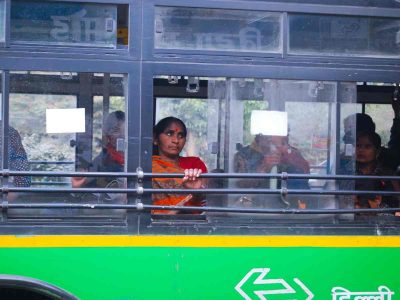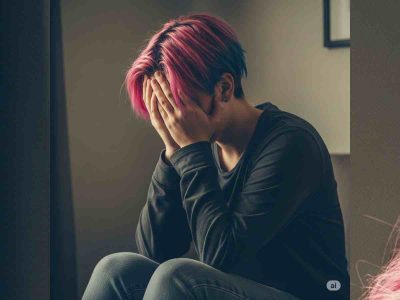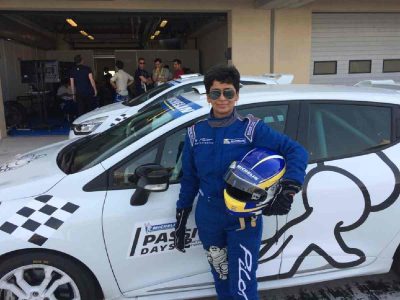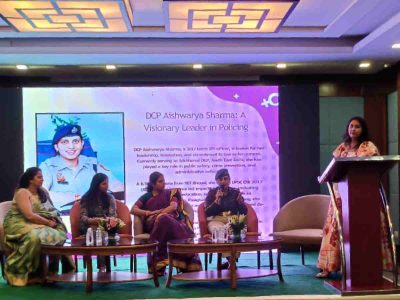Vidur Sethi, a 28-year-old actor, who identifies with the pronouns they/them, was born and brought up in north Delhi’s Pitampura where the biological family still lives. Sethi comes from an upper caste family, where the father was a banker and mother a teacher. Their paternal grandfather came from Pakistan at the time of Partition so the family went through a lot of turmoil before settling down.
“I’ve had a distant relation with my family because of queer identity,” shares Sethi. Sharing a fond memory, the actor says, “When I was a child, I used to be served food on my lap while I was studying. My head used to be bowed down because I was reading books so a hand would just come and put the food on my lap.”
Their mother, they say, is still an essential part of work. “I realize that she never left me. She remained in my work: she is there in all my paintings, in all my poems”.
When did you begin to understand queerness?
When I was 16 years old, Godya Vaishnav Sampadya has a important part to play in my queerness. I interpreted in terms of queerness because Chaitanya Mahapatra enters the body of a human. The feeling is that of trying to understand what Radha feels for Krishna. So he comes to the body of man but the molten golden complexion which is taplapanti gaurangi, is Radha’s complexion.
As a child, you don’t know about these words: what is gender, what is queerness, especially if you belong to a certain kind of family. I think later on I started to formulate that.
Having said that, there was a lot of criticism that I have in terms of distinctions between the binary of the man. I just felt that even in the philosophy of things they could be amended but then in the execution of it the binary exists, whether it was in terms of caste or gender.
Tell us about your role in Pine Cone.
The movie takes you through the journey of the protagonist, Sid Mehra, and dives into his journey, struggles, his sexuality, and his love for art in three phases of his life: at 18 years, 28 and 38. It’s a romantic story, so people would get to see a lot of interesting experiences in the life of a person who’s also quite successful. This is the life story of a queer artist.
Did your own identity come in the way? Did you make major changes in the script?
Being from the queer community did make a difference but because this is also my first film, I’m entering the film set for the first time. I’ve done performances in theatre but filmmaking is a totally different ballgame.
I wanted to empathize with the character but not let my emotions get the best of me. I would sit and think of a common point where Sid and Vidur can meet, their conversations, so that I come to a meeting point and maintain the distance between reality and acting.
Besides my queer identity, my identity as an artist is also there. The camera is a very different space. I’ve had certain experiences but I don’t think I’ve reached a stage where my personal experiences affected my character on-screen in a major way. There were certain points of intersection between my identity and the character but there was no major impact.
Do you feel queer characters can be played better by someone from the community?
The moment you show queer personalities on screen, someone who is anxious and uncertain about his/her body can also deviate from how acting is perceived. The way we can add layers to the characters can be amazing because we’ve never really had queer actors.
So I think queer actors playing a queer character will be better actors. They will be able to bring the missing nuances and i think there should be a higher representation from the queer community in the media and film industry.
What changes have you seen in treatment of the community over the years?
Nuances are missing when it comes to the portrayal of queer characters in onscreen characters but I think that nuance is missing in every cinema industry. Over the years, the characters shown have been irrelevant and unrelatable. Change is coming slowly and steadily. Also, what we need to realize is that for the longest time in our country, queer people were considered criminals under Section 377. So it becomes hard to come out and tell real and detailed stories no matter from what caste and class you are. I think the Hindi film industry multiplies that into characters that are assimilated and masculine.
Gradually, things are changing and queer characters are being depicted in a different and more real way, Also, earlier there used to be only movies about coming out stories and the tragedies related to coming out; these were essential but now different stories are being told.
For instance, Pine Cone focuses on the point that a queer person can also have a successful work and love life just like any other person out there. I hope there are more movies like that in the future.
Do you think audiences are ready to accept non-binary love stories?
It feels good when you see LGBTQIA+ stories getting the attention they deserve, especially from the middle class. To see that accessibility is happening to LGBTQIA stories is quite comforting. However, I do believe that there is a certain class of people that gets affected, especially middle class people – the parents more than the chidren, for children will take their parents to see these movies. I hope it would change their mindset and perception of homosexuality but there’s a lot of work that still needs to be done to reach the grassroot level. A more accurate presentation of the characters will help us more effectively.
The marginalized section should also be represented, apart from the upper caste characters as shown in the movie. There are queer people in the Dalit and Adivasi community and once their stories are also told, it would be a great step towards acceptance from the larger society.
For more stories that cover the ongoings of Delhi NCR, follow us on:
Instagram: https://www.instagram.com/thepatriot_in/
Twitter: https://twitter.com/Patriot_Delhi
Facebook: https://www.facebook.com/Thepatriotnewsindia





